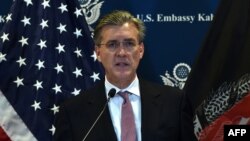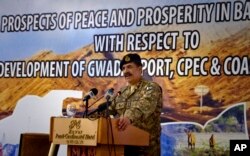The U.S. diplomat who once steered Washington's relations with Afghanistan and Pakistan says Islamabad's growing closeness with Beijing could pose new challenges to already frail U.S.-Pakistan relations.
Richard Olson was the U.S. special representative for Afghanistan and Pakistan and was previously U.S. ambassador to Pakistan. In a Voice of America interview, he warned that growing rivalries between the United States and China were likely to complicate security and other issues in this already volatile region.
A contest between Washington and Beijing for dominance can frame the U.S.-Pakistan relationship and bring "new challenges," Olson said.
Some of Pakistan's policy elite share this view. Pakistan's former foreign secretary, Salman Bashir, told VOA that Washington should not view regional issues through the lens of the U.S.-China rivalry that intensified this year.
"There is a tendency in Washington's policy circle to view everything as part of the great game. Pakistan has already experienced this as a U.S. ally during the Cold War years against the then-Soviet Union, and that cooperation turned into a disaster for Pakistan. We are not ready to be part of this new great game," Bashir said.
However, the U.S and China agree on some issues related to Afghanistan, believing that a stable Afghanistan could help economic development and regional integration for South and Central Asia.
Olson said China "would want to see Afghanistan included in its Belt and Road Initiative and somewhat aligned with CPEC [the China-Pakistan Economic Corridor]. But the first step is to establish security and achieving a political settlement [with the Afghan Taliban]."
He said Pakistan could play a significant role in that matter, because it has some sway over warring Taliban factions.
"If Pakistan can help bring the Taliban to the table, it would also dramatically improve its relations with Washington, which is pursuing a single-point agenda of striking a political settlement and achieving peace in Afghanistan," Olson said.
However, he acknowledged that during 2018, the strategic divergence between Islamabad and Washington grew wider than ever. The former ambassador said "there is still a window of opportunity available to Pakistan in terms of helping the U.S. secure peace in Afghanistan. And I don't believe Pakistan can deliver the Taliban to the table. But they can definitely take certain initiatives to make that happen."





